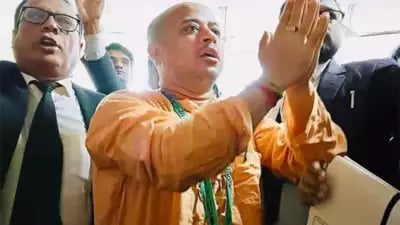Bangladesh Court Rejects Bail Plea of Former ISKCON Priest Chinmoy Das
Overview of the Case
In a significant ruling, a Bangladesh court has recently denied the bail plea of former ISKCON priest Chinmoy Das. This decision came amidst growing public interest and media coverage surrounding his case, which has implications beyond personal consequences, touching on broader themes of legal justice and religious freedom.
Background on Chinmoy Das
Chinmoy Das, previously associated with the International Society for Krishna Consciousness (ISKCON), has found himself at the center of a controversy that has elicited varied reactions from the community and legal observers alike. His tenure with the organization was marked by a public commitment to the spiritual and social values espoused by ISKCON, however, allegations against him prompted legal scrutiny that questions the boundaries between individual actions and the institutional reputation of ISKCON.
The Court's Rationale
The court's rejection of Das's bail application reflects the seriousness of the charges against him. Legal experts indicate that such decisions often hinge on the potential for flight risk and the gravity of the offenses. By denying bail, the court aims to uphold the principles of justice and ensure that the judicial process is not hindered. This ruling serves as a poignant reminder of the complexities involved in cases where religious figures are implicated, often leading to broader societal reflections on faith, accountability, and justice.
As the case unfolds, many are closely monitoring the implications it may have on religious communities in Bangladesh. The proceedings not only pertain to the personal fate of Chinmoy Das but also resonate with larger discussions about the intersection of religion and law in a rapidly modernizing society. The decision to reject his bail plea exemplifies the judiciary's role in navigating these intricate issues.
Overall, the rejection of Chinmoy Das's bail plea by the court exemplifies the complex interplay of law and religion in contemporary Bangladesh. It raises critical questions about accountability, community standards, and the role of religious institutions in modern society. As this case progresses, it will be essential to observe its effects on the perceptions of religious freedom and legal justice in the region.


